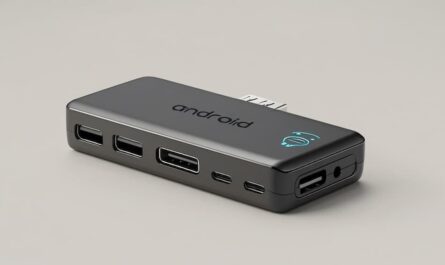T-Mobile, in collaboration with its parent company Deutsche Telekom, is working on a revolutionary concept: an app-less phone. Imagine a smartphone where you don’t need to navigate through a cluttered home screen filled with apps. This device promises to simplify your digital life. It uses artificial intelligence (AI) to handle tasks traditionally managed by multiple apps.
T-Mobile’s app-less phone shows a notable shift in how we interact with smartphones. While it offers a streamlined user experience, it also poses challenges related to AI reliability and user adaptation. It will be interesting to see how this concept unfolds. We will also see if it becomes a mainstream trend as technology continues to advance. We’ve taken a closer look at this innovative technology and what it means for users.
What is the t-mobile app-less phone
It is an app-less mobile phone. It is often referred to as the “AI Phone.” And it is designed to run without the need for traditional apps. Instead, it relies on ai assistants to carry out various tasks, like booking flights, shopping, and editing photos. These tasks are accomplished through voice commands or text inputs only. This concept was showcased at the Mobile World Congress (MWC). It is expected to be released in the second half of 2025.
How does the app-less phone work
AI phone uses advanced ai technologies from partners like Google Cloud, ElevenLabs, and Picsart to provide a seamless user experience. The phone’s interface is blank, with no visible app icons. Users interact with the device using voice commands or by tapping a microphone button to initiate actions. For example, you can ask the phone to find luggage suitable for an airplane overhead bin. The phone will provide relevant results. You won’t need to open multiple apps.
What are the benefits of the app-less phone
There are benefits like simplified user experience. The app-less phone design streamlines interactions by centralizing tasks through ai. It makes it easier for you to manage your digital lives.
On the other hand, tasks like booking flights or making reservations can be completed quickly too. This happens without you having to switch between apps. More so, when it comes to accessibility, relying on voice commands can be especially helpful. This is particularly true if you struggle with traditional app interfaces.
While the idea of an app-less phone is intriguing, it also raises several concerns like, dependence on ai. Users might feel uneasy relying solely on ai for daily tasks, especially if the ai fails to understand commands accurately. Also limited customization too. The lack of traditional apps might limit users’ ability to customize their phone experience according to their preferences.
The details on the pricing of the T-Mobile AI Phone are not yet fully disclosed. However, it is expected to be budget-friendly. This aims to make the technology accessible to a wide audience. The phone is slated for release in the second half of 2025.
How does t-mobile’s ai phone compare to other app-less phones
T-mobile unveiled its ai phone as a concept at Mobile World Congress 2024. This move represents a bold departure from traditional smartphones by eliminating visible apps in favor of an ai-driven interface.
Here’s how it compares to other app-less phones like the Rabbit R1
| Feature | T-Mobile AI Phone | Rabbit R1 |
|---|---|---|
| Interface | Voice/text-driven AI assistant | Similar AI-driven interface |
| Task Handling | Replaces apps with generative AI | Replaces apps with natural language AI |
| Hardware Partner | Qualcomm Snapdragon 8 Gen 3 | Not specified |
| Availability | Concept stage; no release date announced | Available for pre-order; starts to ship mid-2024 |
| Price | Not disclosed | $199 |
As we know it, both phones aim to simplify user interaction. They do this by removing apps and using ai for easier task execution. T-Mobile’s phone showcases advanced use cases like image generation and product refinement. The concept of app-free phones may struggle in today’s ecosystem where apps dominate functionality. Additionally, reliance on voice commands may not suit all users or scenarios.
While T-Mobile’s phone is still a concept, it highlights a potential shift toward ai-first mobile experiences. But, its practicality and adoption will depend on user reception and integration into existing digital ecosystems.
What ai technologies are integrated into t-mobile’s new phone
Ai-powered digital assistant. This assistant uses multi-modal Large Language Models (LLMs) to simplify user interactions and improve personalization. T-mobile is integrating advanced ai technologies into the new smartphone concept, developed in collaboration with Qualcomm and Brain.ai. The phone relies on cloud-based ai for functions too.
In addition to cloud-based ai, the phone includes on-device ai processing Snapdragon 8 Gen 3 chipset too. This processor enables real-time decision-making and improved performance. T-mobile is also introducing an “IntentCX” platform in partnership with OpenAI.
For more information on the T-mobile 5G upgrades, check out this post on: What is the 5G Record for T-Mobile?
Meanwhile, the t-mobile system will proactively handle customer support tasks too, and execute account changes based on real-time data and user permission. These innovations reflect their vision of transforming smartphones into intuitive, ai-driven devices that simplify daily life.
How does the ai phone handle privacy and security concerns
1. On-device processing
Many ai features are designed to operate directly on the user’s device. This guarantees sensitive data remains private, and it stays under the user’s control. AI phone tackles privacy and security concerns with on-device processing. It also employs advanced cloud architecture and robust data protection strategies. This approach eliminates risks linked to transmitting data to external servers.
It also improves security by reducing exposure to potential breaches during data transit. On-device ai processing minimizes latency and improves performance while maintaining privacy.
2. Private cloud compute (PCC)
For tasks that require more computational power than on-device processing can handle, ai phones uses a system. This system is called Private Cloud Compute. This system handles tasks demanding more power. This ensures that user data sent to the cloud is not stored or accessible by the company, including Apple itself.
Apple claims PCC is one of the most advanced security architectures for cloud-based ai. It is designed to prevent unauthorized access. It also protects against the misuse of personal information.
3. Data minimization and encryption
AI phones employs strict data minimization practices, making sure only important data is processed. This lowers the chance of revealing personal information. Encryption is applied to secure data both at rest and in transit, protecting it from malicious actors or unauthorized access.
4. Transparency and user control
Users are provided with clear information about how their data is collected, used, and stored. They retain control over their personal information, including options to access, update, or delete their data as needed. Consent mechanisms are in place to ensure users agree to any data usage explicitly.
5. Addressing broader privacy risks
Most ai phones incorporates anonymization techniques to strip identifiable information from datasets used for ai analysis. Data aggregation further ensures that individual details are not exposed. Regular safety checks and strict access controls are implemented to prevent unauthorized access or breaches.
These measures indicate a growing trend in ai technology. This trend prioritizes your privacy by design. It also maintains functionality and user convenience. But, experts stay cautious about how effectively these interventions will execute in practice as the technology unfolds.
We are, however, more concerned about the adoption rate of this app-less phone. How quickly users will adapt to this new interface is uncertain. This is especially true for those accustomed to traditional app-based smartphones.



